1962 European Championships
Belgrade, Yugoslavia, September 12-16
800
Ranked third and second in the world in 1960 and 1961, Paul Schmidt (31) of Germany was the 800 favorite. And he had looked good in winning his semi-final. His compatriot Manfred Matuschewski (23) also had good credentials, with a 9th place world rankings in 1960. Further, both German runners had been Olympic finalists in Rome, placing fourth and sixth. The two Russians, Krivosheyev and Bulishev, also looked like possible medalists. As well, Ireland’s Derek McCleane was considered to have a chance (his talented team-mate Noel Carroll was eliminated in the first round).
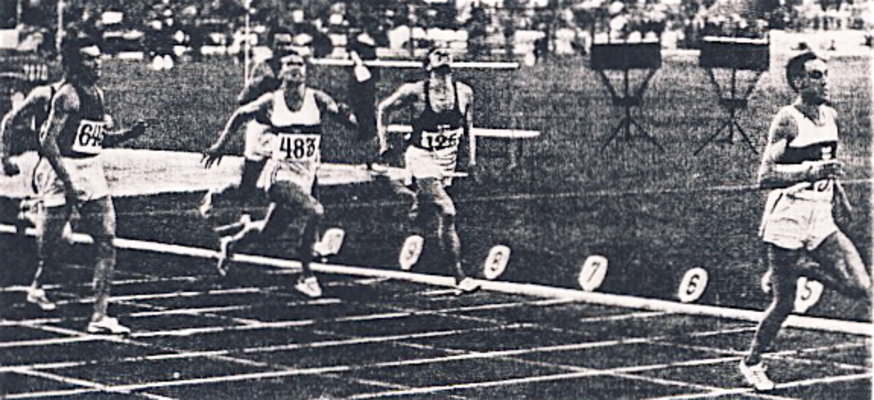 |
| Matuschewski's clear margin at the tape. |
The early slow pace indicated that this was going to be a very tactical race. Olavi Salonen (29) and McLeane were reluctant early leaders, taking the field through in 26.5 and 56.9. The third 200 was barely faster: 28.1. When the bunched field spread out in the final stretch, any one of the six could have won. But Manfred Matuschewski exploded from the field for a clear victory. While his margin over second place was 0.7 of a second, the other five finalists were only 0.3 apart. The fluent German runner looked in a different class in the home stretch, making full use of his 47.9 400 speed. His lap times were 57.1 and 53.4. And although his final time of 1:50.5 was only 0.2 faster than Rudolf Harbig’s winning time in the1938 Euros, Matuschewski performance was most impressive.
In the mad scramble for second place, the Soviet Union’s Bulishev just beat the more experienced Schmidt. Second, third and fourth all shared the same time of 1:51.2.
1. Manfred Matuschewski GER 1:50.5; 2 Valeriy Bulishev USSR 1:51.2; 3. Paul Schmidt GER 1:51.2; 4. Olavi Salonen Fin 1:51.2; 5. Derek McCleane IRL 1:51.4; 6. Abram Krivosheyev USSR 1:51.5.
1,500
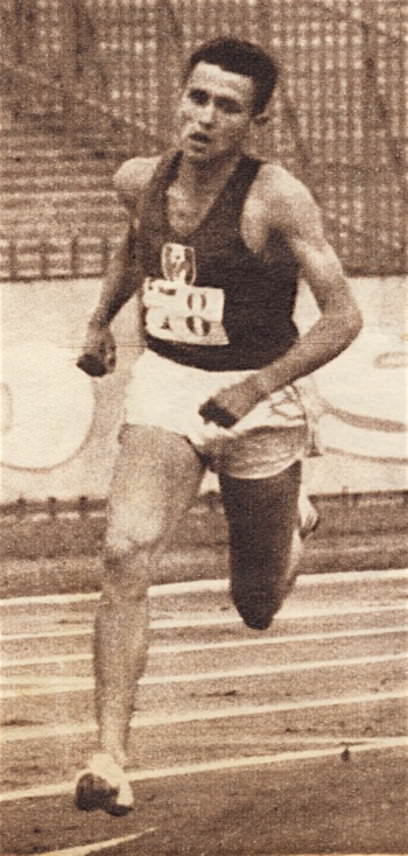 |
| Michel Jazy |
There was a clear favorite in this race: Michel Jazy of France, who had run brilliantly in the Rome Olympics behind Herb Elliott. As well, he had incredible acceleration at the end of a race. Jazy had had a quiet 1961 season, but was in top form for the 1962 track season. In June he had broken both the 2,000 and 3,000 WRs. Facing Jazy were two fine runners, Witold Baran of Poland and Vasiliy Savinkov of USSR, but neither was in his class. Nor were the three Germans in the nine-man field.
Savinkov took the early lead, but Jazy himself soon took over. The first lap was a brisk 59.8. Jazy led for most of the next lap. Then Baran took over, passing in 2:01.0. Jazy shadowed the Pole until making his effort with 200 to go. His last 200 in 25.9 gave him a 1.1 second advantage at the tape. Behind him Baran just held off surprising Czech Tomas Salinger for second. This was an easy victory for Jazy, who wrote later in his book Mes victoires, mes défaites, ma vie that he had no difficulty at all in winning this European title.
Footnote: Upcoming German star Harald Norpoth (20) fell with just over a lap to go. After a desperate attempt to regain contact, he dropped out. Until his fall, he had been well positioned in the race for medals.
1. Michel Jazy FRA 3:40.9; 2. Witold Baran POL 3:42.1; 3. Tomas Salinger CZE 3:42.2; 4. Heinz Bothling GER 3:42.7; 5. Werner Krause GER 3:43.8; 6. Vasiliy Savinkov USSR 3:44.2.
5,000
Following his convincing 10,000 win, Pyotr Bolotnikov looked a good bet for this race too. But his 5,000 heat was held only 24 hours after his 10,000 final. Further, he was forced to run a fast 13:53.4 to qualify (10th fastest time in the 1962 world rankings), so his recovery powers were sure to be tested. The two other heats were won in the slow times of 14:14 and 14:15. Janke, who had run so well in the 10,000 was still tired and could manage only 8th in his heat. Prominent among the qualifiers were Zimny and Boguszewicz of Poland and Frenchmen Bogey and Bernard. Englishman Tulloh thought he had a chance, but he had recently been beaten by Zimny.
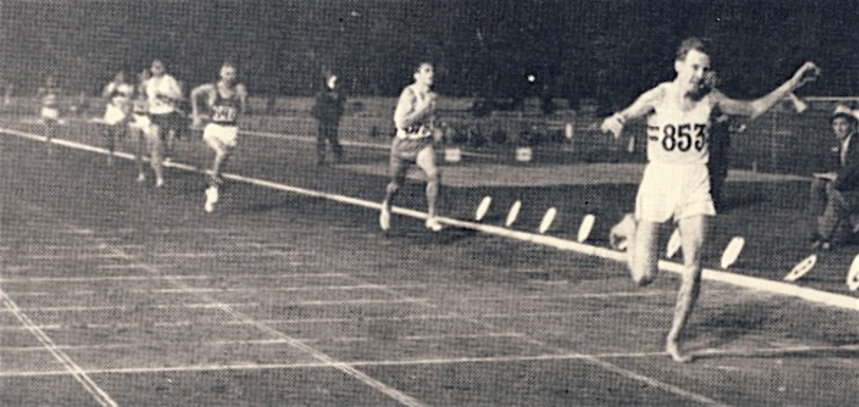 |
| Barefoot Bruce Tulloh outsmarts the 5,000 field. |
Surprisingly, Bolotnikov forced the early pace, perhaps trying to shake of the fatigue he was certainly feeling. He took the field through in 62.8 and 2:48 (14:00 pace). He kept the same pace though 2K (2:49.5) but then began to slow. Nevertheless, the Russian still led through 3K in 8:37.5. This third K in 3:00.5 was too slow for Jurek of Czechoslovakia, who took charge in the ninth lap to lead through 4K in 11:26.4 (2:48.9). Jurek’s injection of pace was too much for Bolotnikov, who dropped back. With 800 to go, Bernard of France was in the lead, followed by Tulloh, Boguszewicz, Zimny and Bogey. No one was willing to take charge of the race, or as Tulloh put it, “nobody…seemed to have much idea of what to do.” (Tulloh on Running, p.111)
The big move came on the back straight when barefoot Bruce Tulloh took off with just 700 to go, only Bernard managing to stay with him—but not for long. It was a decisive break, but by the bell Zimny had moved up to within 4m of Tulloh. For the rest of the race it was a question of whether Zimny could catch the barefoot Englishman. But Tulloh, running the last 600 in 87.0 still had a lot left. The Pathé News film shows him leading by almost 15 meters coming into the straight. Keeping his scuttling running form well, Tulloh was able to hang on and hit the tape with 10 meters to spare over Zimny. In third was Bolotnikov, who had managed to work his way through the field in the last lap.
“It was very tactical,” Tulloh recalled years later. “If the Russian had led all the way, I’d have let him and kicked away at the end. But we were all bundled up, so I decided to kick with 700m to go.” (BBC Sport Archives, Aug. 2, 2002) It was a tactic similar to Halberg’s in the Rome 5,000 two years earlier. And like Halberg, the exhausted Tulloh collapsed on the grass after the race. Going so early is a hard way to win a race.
1. Bruce Tulloh GBR 14:00.6; 2. Kazimierz Zimny POL 14:01.8; 3. Pytor Bolotnikov USSR 14:02.6; 4. Lech Boguszewicz POL 14:03.4; 5. Michel Bernard FRA 14:03.8; 6. John Anderson GBR 14:04.2.
10,000
This was not a fast race, the winner clocking 36 seconds slower than the WR. But it was an exciting race with only 3.2 seconds separating second and sixth. Pyotr Bolotnikov (32), with a recent WR of 28:18.2, was considered the strong favorite. In fact he was in a class of his own in a weak field for a major championship.
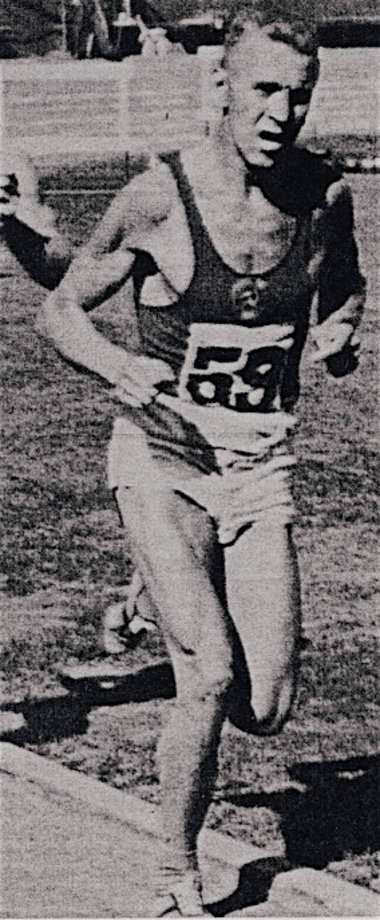 |
| Pyotr Bolotnikov |
And as if to demonstrate his superiority, he immediately roared into the lead, passing 400 in 63.4 and 1,000 in 2:45.3. He was already on his own. But then Frederich Janke (31), a 5,000 specialist, moved up from the field and glued on to the Russian. After 2K (5:35.4) Bolotnikov let the pace slow, probably thinking of his 5,000 heat the next day. So the surprising German was able to stay with Bolotnikov through kilometers of 2:51, 2:56 and 2:56.4 to reach 5,000 in 14:18.6.
The pace slowed even more after this: 2:57, 2:59.4, 3:00.6, and 2:57. Despite this slowing, Bolotnikov and Janke were still out on their own. Behind them, but out of contact, Robert Bogey of France was battling for the bronze medal with Roy Fowler and Martin Hyman, both of Great Britain. Fowler had been 200m behind the leaders at 5,000 but had made a remarkable recovery. With seven laps to go, according to Fowler, “Bogey got very rough and he hit Martin Hyman in the solar plexus and nearly put him out altogether.” (Athletics Weekly, April 10, 1976) Bogey had a history of “bad track manners,” and they were noticed from the press box in this race as he cut in on both Brits more than once. (The Times, Sept, 13, 1962)
In the last kilometer Janke surprised everyone by bursting into the lead. It was a desperate move as by the bell, Janke was spent. Bolotnikov took control with a last lap under 58 that took him 7.6 seconds ahead of Janke at the tape. Still, Janke ran a brilliant race, shaving 19.6 seconds off his PB.
But Janke had to work really hard on the last lap as he was almost caught by the three runners fighting for the bronze. In this last lap Bogey tried desperately to hold off two British runners, Fowler and Hyman. After the earlier “bad track manners” Fowler and Hyman were even more determined to beat the Frenchman. Bogey led his two rivals on the back straight and held off a determined attack before the final bend. In the home straight, Fowler and Hyman tried again, both of them finally getting by in the last 30 meters, with Fowler just ahead for the bronze. Fowler’s desperate sprint almost got him second.
1. Pyotr Bolotnikov URS 28:54.0; 2. Frederich Janke GDR 29:01.6; 3. Roy Fowler GBR 29:02.0; 4. Martin Hyman GBR 29:02.0; 5. Robert Bogey FRA 29:02.6; 6. Leonid Ivanov USSR 29:04.8.
Marathon
It was an “extremely hot” day for a marathon, according to British hopeful Brian Kilby (24). To add to his concerns, the Belgrade course had cobblestones for some the first 11 miles. The only compensation was the shade along the treelined streets. Kilby, three-time British marathon champ, was Britain’s main hope, but he was by no means a favorite. Russians Popov (1958 Euro champ) and Baikov looked really dangerous. Also favoured were Vandendriessche of Belgium, Ozog of Poland and Kantorek of Czechoslovakia.
Ozog went out fast and was soon well ahead of the field. For the first seven miles the main bunch contained about 20 runners, but then it thinned out to about ten. After 11 miles the road surface improved, and the pace quickened. Kilby moved up and followed a two-man Russian break. The chasing trio dropped one Russian to leave Baikov and Kilby alone behind Ozog. Then Vandendriessche joined them just before 30K. Meanwhile Ozog had dropped out.
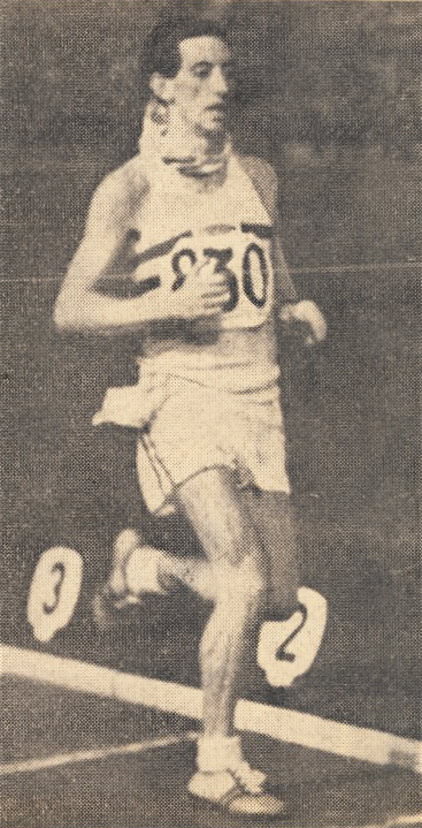 |
| Brian Kilby finishes in 2:23:18. |
Around the 30K mark, Kilby forged ahead on his own, never to be caught. Behind him, Vandendriessche held off Baikov for second. In fourth was Scot Alastair Wood, who had started running marathons just that year. He held on to the experienced Baikov for as long as he dared but eventually realized that he lacked “the basic strength” to fight all the way: “I had to let discretion be the better part of valour and relax over the last four or five miles,” he said. (Road Runners Club Newsletter)
Kilby did not appear to suffer much from the heat. He looked as fresh as could be expected as he finished a clear winner by 44 seconds. “Throughout,” he said, “the race had gone as smoothly as if to a self-made plan.” (Road Runners Club Newsletter) At the end of the year Kilby also won the Commonwealth Marathon in Perth. Aurele Vandendriessche (30) ran his best race to win the silver medal; he had finished 23rd in the 1956 Olympics and 11th in the 1958 Euros. Reigning champion Popov disappointed with fifth place; he was never able to match his fine 1958 World Best of 2:15.17.
1. Brian Kilby GBR 2:23:18; Aurele Vandendriessche BEL 2:24:02; 3. Viktor Baikov USSR 2:24:29; 4. Alastair Wood GBR 2:25:57; 5. Pavel Kantorek CZ 2:26:54; 6. Sergei Popov USSR 2:27:46. 
Leave a Comment